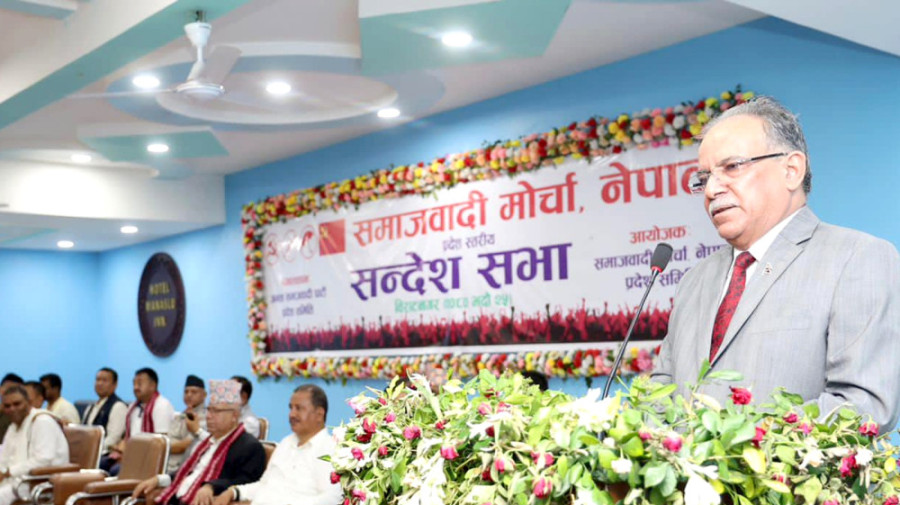Editorial
Fighting a straw man
Prime Minister Dahal, as always, is on the lookout for a non-existent class enemy.
One constant about Pushpa Kamal Dahal, the current prime minister, in his over 17 years of public life is his perpetual search for a “reactionary”. He looks for the reactionary figure among the crowd of his supporters, among his top partymen (there are hardly any women anyway), among his coalition partners, and even among his Cabinet members. It seems it is important for him to seek out that reactionary—this mysterious figure lurking around, conspiring to topple the government, attack the leadership, or break the nation apart. The search for this reactionary figure has become all the more critical as Dahal and his party do not have a barga shatru, or class enemy, anymore, thanks to their almost uninterrupted spell in power since they became mainstream. The realisation that they are now the new barga shatru of the unemancipated must be too difficult for them to stomach.
What else explains Dahal's call for support in fighting a “political war”? Who is this enemy that the prime minister wants to fight with the help of the people on the streets when he has all the keys to the oppressive state apparatuses in his hands? Dahal's latest tirade against a straw-man enemy, while speaking in Biratnagar, seemed to be driven by an age-old preoccupation of Nepali communists to seek out foes where there are none.
If the prime minister is planning to fight the deep state—a secret network of power that is thought to operate from within the state mechanism against the government—then the street is perhaps not the right place to start. Perhaps he is the most well-equipped to deal with the intricate network of the deep state, considering his skills in sidelining big political titans and head the government despite his party coming a distant third in the general elections. Otherwise, Dahal’s exhortation for a street-level rebellion against an enemy that does not exist is nothing but an unnecessary affront to the people who have voted in a new government, paid their taxes and fulfilled their duties as citizens.
Unfortunately, 17 years after they let go of their rebel life in favour of mainstream, democratic politics, the Maoists harbour the dreams of a rebellion and speak in the language of insurgents. And that is wholly unsavoury. In fact, this is the language they used during the insurgency and in their initial years in mainstream politics. A new generation of Nepalis has grown up with little or no knowledge of the insurgency, and a significant section of the population that experienced the insurgency has moved on, having employed well-calculated amnesia, for there is no point dwelling in the past when the world is moving forward. They are not going to buy the prime minister’s call for a rebellion, street or otherwise.
And it is a bit too rich for the prime minister, who has made little attempt to conclude the transitional justice process, to talk about yet another rebellion. Let alone solving the insurgency-era cases, Dahal has failed to seek justice for the victims of the 2007 Gaur massacre, in which most of the 27 victims belonged to his own party. Just last month, he promised justice to the family of the Gaur victims, only to reassure his coalition partner, Upendra Yadav, the prime accused in the case, that he had nothing to worry about. Dahal and his cohort would fancy explaining this fruitless search in terms of Marxist dialectic. But in reality, it is just doublespeak. The prime minister would do well to focus his attention on fulfilling his constitutional role as the executive head of the State, and stop playing with the emotions of the people with the regressive talk of war or rebellion.




 18.12°C Kathmandu
18.12°C Kathmandu














